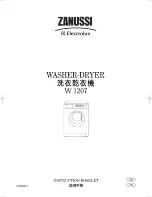
10
• ALWAYS spray the ground to test pressure.
• NEVER exceed the recommended pressure rating of the unit.
•
NEVER change quick couplers with the nozzle under pressure & without the gun
safely in the lock position.
• NEVER spray water directly at the pressure washer.
• Locate the equipment on a solid level surface so the oil can be distributed evenly
inside the crankcase.
•
PRACTICE & TEST using the pressure washer on each new material & area you
spray.
The pressure washer is extremely powerful and can damage property if
untested.
• ALWAYS use the safety lock latch on the lance gun when the pressure washer is
on but not in use.
This will reduce the risk of accidental discharge.
Additional hazards and risks
•
Mechanical hazards.
Be sure the engine is filled with oil before startup. ENSURE
hoses are connected properly before operating. BE CAREFUL not to come in contact
with the exhaust when the engine is hot, it can cause severe burns. ENSURE that the
repairs to the motor and equipment are carried out by suitably qualified personnel.
•
Fire & explosion hazards.
PETROL is extremely flammable and explosive under
certain conditions. ENSURE that the petrol is only stored in an approved storage
container. DO NOT refuel while it is in operation or hot. Allow engine to cool before
refueling. DO NOT refuel the motor in the vicinity of sparks, a naked flame or a person
smoking. DO NOT over fill the fuel tank and avoid spilling petrol when refueling. Spilled
petrol or petrol vapor may ignite. If spillage occurs, ensure that the area is dry before
starting the motor. ENSURE that the fuel tank cap is securely fitted after refueling.
NEVER spray flammable liquid.
•
Noise hazards.
EXCESSIVE NOISE can lead to temporary or permanent loss of
hearing. This pressure washer can produce sounds of up to 103dBA during operation.
Ensure hearing protection is worn when in use. WEAR an approved hearing
protection device to limit noise exposure as required by Occupational Health and
Safety regulations.
•
Chemical hazards.
DO NOT operate or refuel a petrol motor in a confined area
without adequate ventilation. DO NOT use with toxic chemicals, only use non-?
hazardous approved cleaning agents. NEVER spray toxic, harsh acidic or alkaline
liquids.
•
High pressure water hazards.
High pressure can cause serious injury including
injection of water under the skin if caution is not taken. NEVER point the spray gun at
people, animals or plants. NEVER put your hands or fingers over the spray tip. NEVER
try to stop or deflect leaks with your hand or body. NEVER use powder detergents or
soaps not manufactured specifically for use with pressure washers.











































